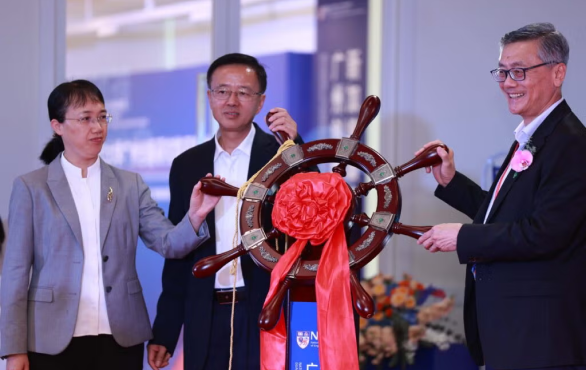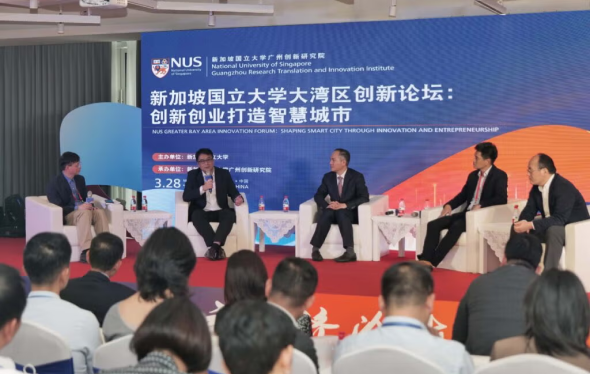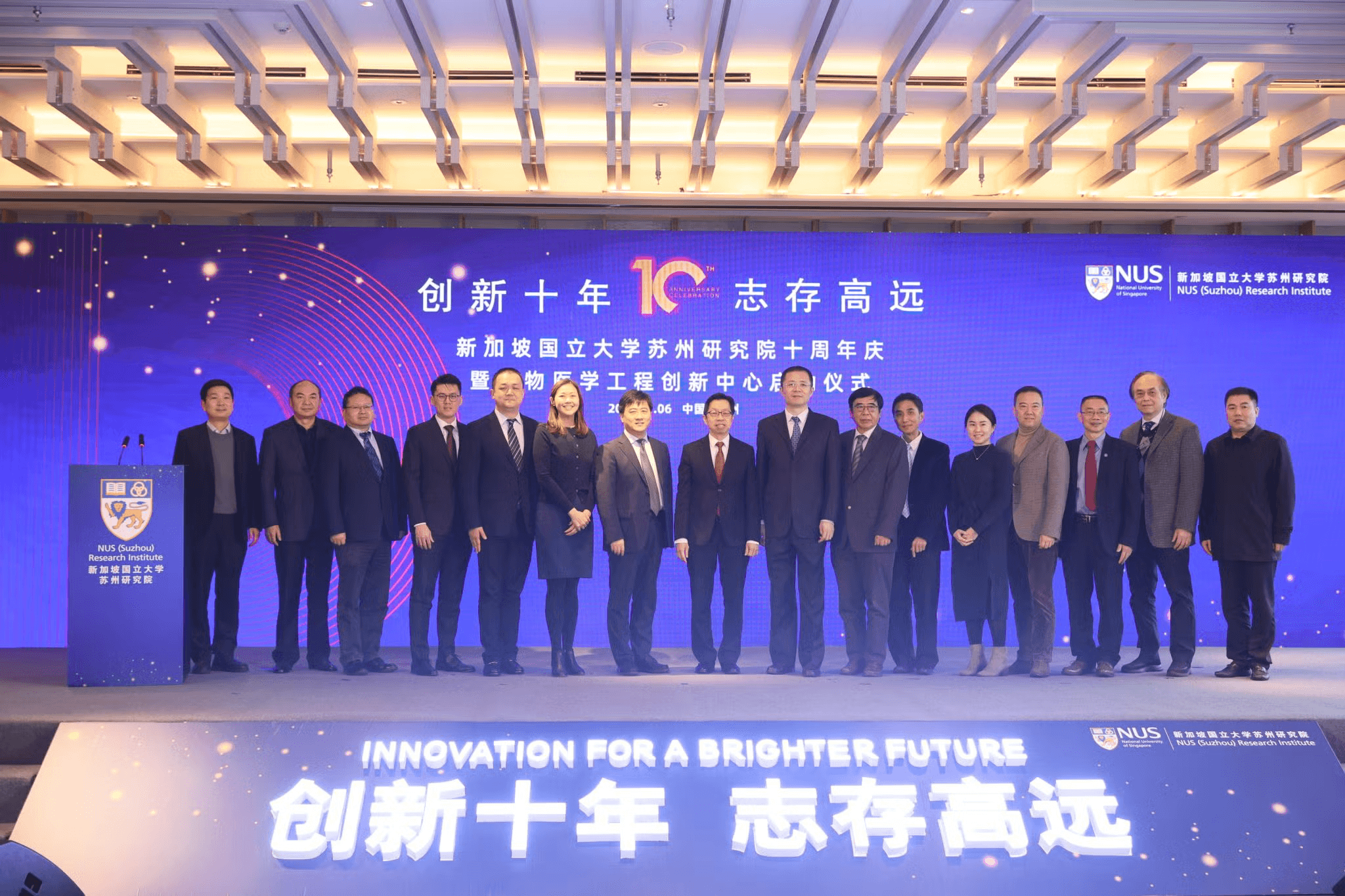
The National University of Singapore (Suzhou) Research Institute (NUSRI Suzhou) marked its 10th anniversary with a celebratory event and the official launch of its new Innovation Centre for Biomedical Engineering, held on 6 January 2022.
Gracing the occasion were Mr Chua Teng Hoe, Consul-General of the Republic of Singapore in Shanghai; Ms April Oh Lay Yen, Regional Group Director at Enterprise Singapore (ESG); Mr Lin Xiaoming, Deputy Party Secretary of the CPC Suzhou Industrial Park (SIP) Working Committee and Chairman of the SIP Administrative Committee; Mr Ni Qian, Member of the CPC SIP Working Committee and Vice Chairman of the SIP Administrative Committee; and Professor Ho Teck Hua, then Senior Deputy President and Provost of NUS, who attended virtually.
Centred on the theme “Innovation for a Brighter Future,” the event celebrated a decade of progress and achievement in Sino-Singapore cooperation across technology and education. The event featured a series of milestone moments, including strategic MoU signings, keynote presentations and panel discussions. It convened a diverse community of academics, entrepreneurs, investors, corporates, startups and government stakeholders to exchange ideas and share experiences.
In conjunction with the anniversary, NUSRI Suzhou unveiled the Innovation Centre for Biomedical Engineering (BME Centre), aligning with SIP’s strategic focus on biomedicine and healthcare as its top industry priority. The Centre will drive research and innovation in digital medicine, smart health technologies and medical equipment. Principal Investigators from the Department of Biomedical Engineering, College of Design and Engineering, NUS, will work closely with local research teams at NUSRI Suzhou on collaborative R&D projects aimed at addressing key challenges in the biomedical field.
To strengthen its links with industry, NUSRI Suzhou also signed agreements with Zhejiang Zhongwei Medical Research Co., Ltd. and Suzhou Shuitiantang Food Science & Technology Co., Ltd. These collaborations will support joint research in biomedical engineering and food science, bridging the gap between innovation and application, and cultivating a pipeline of skilled talent.
The growth of NUSRI Suzhou over the past decade exemplifies the deepening collaboration between Singapore and China in the realms of education, research and technology. Tapping into NUS’s strong research foundation, the institute continues to serve as a platform for academic exchange, innovation and cultural engagement — enhancing the university’s global impact and contributing meaningfully to the development of the region.

(From right) NUS President Professor Tan Eng Chye; Mr Wang Guilin, Vice Chairman of the Guangzhou Municipal Committee of the Chinese People’s Political Consultative Conference, Director of Guangzhou Science and Technology Bureau; and Ms Xian Yinsong, Director-General, The People’s Government of Huangpu District, Guangzhou; officially opened the new building that will house the National University of Singapore Guangzhou Research Translation and Innovation Institute (NUS GRTII).
During the ceremony, NUS GRTII Director Professor Meng Qiang inked strategic collaboration agreements with 13 partners, one of which was WeRide, a tech company specialising in autonomous driving technologies. The ceremony also unveiled the first cohort of nine startups to be incubated at NUS GRTII.
The cohort included Singapore-based digital PCR tech company JN Medsys as well as Yimiji Technology, which develops AI-based medical image processing and analysis platforms and smart surgical robotics. NUS GRTII will support these ventures through business incubation, technology transfer and research commercialisation efforts that are poised to benefit Singapore, Guangzhou and the Greater Bay Area.
Education is also an integral pillar of NUS GRTII. Over the next decade, the institute is set to train more than 2,200 Chinese PhD and Master’s students, along with post-doctoral fellows and professionals in critical fields. Together, the Huangpu District Government, Guangzhou City Government and various corporate sponsors will offer scholarships that enable aspiring students to pursue their postgraduate studies at NUS in Singapore.
Education is also an integral pillar of NUS GRTII. Over the next decade, the institute is set to train more than 2,200 Chinese PhD and Master’s students, along with post-doctoral fellows and professionals in critical fields. Together, the Huangpu District Government, Guangzhou City Government and various corporate sponsors will offer scholarships that enable aspiring students to pursue their postgraduate studies at NUS in Singapore.
Shaping smarter cities through innovation and entrepreneurship
The NUS Guangzhou Research Translation and Innovation Institute (NUS GRTII), the fourth and latest NUSRI in China, is now officially open. It is the university’s flagship initiative in the Guangdong–Hong Kong–Macau Greater Bay Area — one of the most vibrant hubs for entrepreneurship and innovation in southern China — in collaboration with the People’s Government of Guangzhou Municipality and the China–Singapore Guangzhou Knowledge City Administrative Committee.
Innovation and entrepreneurship are the bricks and mortar of modern, intelligent cities. After the inauguration ceremony, the NUS Greater Bay Area Innovation Forum: Shaping Smart City through Innovation and Entrepreneurship took place. The event was a melting pot where experts, scholars and entrepreneurs from diverse fields gathered to exchange ideas and share insights. With a spotlight on driving high-quality development through innovative practices, the forum leveraged Singapore’s expertise in building smart cities to address the evolving needs of the Greater Bay Area.

Following the inauguration ceremony, the NUS Greater Bay Area Innovation Forum: Shaping Smart City through Innovation and Entrepreneurship took place. The event leveraged Singapore’s expertise in building smart cities to address the evolving needs of the Greater Bay Area.
Discussions at the forum were abuzz with the importance of weaving cutting-edge technology into everyday city operations to enhance the well-being of citizens while promoting sustainable development. Professor Liu Bin, Deputy President (Research and Technology) at NUS, illustrated how advances in materials science could spark breakthroughs in biomedical research.
Meanwhile, Professor Lim Chwee Teck, Director of the Institute for Health Innovation & Technology (iHealthtech) at NUS, explored how AI could give healthcare a shot in the arm, giving a taste of the technologies developed at NUS — from pulsed electromagnetic field therapy to smart insoles designed to prevent slips and falls.

